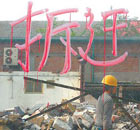Society
Order to close liaison offices under review: report
(Xinhua)
Updated: 2010-01-26 21:50
 |
Large Medium Small |
BEIJING: A Chinese official has confirmed that an order to close thousands of local government liaison offices in Beijing is being considered, the Beijing Daily reported Tuesday.
Outlook Weekly, a Chinese current affairs magazine, reported Monday that "relevant authorities" had ordered counties, industrial zones, and local government departments to close liaison offices in the capital within six months.
The number of such offices, set up to lobby and make representations to central government and its ministries, are thought to exceed 5,000.
The unnamed official from the department in charge of liaison offices affairs under the Government Offices Administration of the State Council, told Beijing Daily that "most of what had been carried by media was contained in the draft" and "the draft is still under review."
He said the implementation of the order would be "soon", but declined to disclose a timetable.
| ||||
Li was the director of a government agency-affiliated liaison office that would be closed down if the report was correct.
Local government liaison officials have reportedly been implicated in corruption cases.
Wang Fuyou, former director of the office of Hebei provincial government in Beijing, was sentenced to life imprisonment in 2002 after being convicted of bribery and misappropriation of public funds.
Wang was entrusted by the provincial government to be in charge of construction projects in Beijing, in which he helped senior officials to get kickbacks in order to win political favors.
Liaison office heads are also empowered to be in charge of the operations of the office and purchasing of goods, in which the annual spending could amount to millions of yuan.
In another case, in last April, heads of two offices were reprimanded by the municipal governments of Luohe and Xuchang in central China's Henan Province over claims that they spent almost $100,000 to buy huge amounts of a luxury liquor that turned out to be fake.
Beijing has an estimated 52 liaison offices representing the provinces, 520 representing major cities, and roughly 5,000 representing counties. The number of agencies based in Beijing would top 10,000 if those set up by various associations, universities and enterprises were included.
The Outlook Weekly report said that liaison offices of provinces, municipalities and autonomous regions and special economic regions could retain their offices in Beijing, while established city-level liaison offices could be kept only after being approved by provincial governments.
Zhu Lijia, professor at the Chinese Academy of Governance, said many county-level liaison offices served as reception centers for officials from their localities and deviated from their original functions.
"County affairs are usually coordinated by cities and provinces, and have little direct contact with ministries. That leaves them enough time to remove their liaison offices from Beijing," he said.
The first local government office in Beijing was set up in 1949 by the Inner Mongolia Autonomous Region. The offices boomed in the 1980s as China began to move from a planned economy to a market economy. Such offices acted as representatives of local governments when the inter-city transport system was far less developed.
Liaison offices usually have assets that include apartments, guest houses and hotels, and restaurants. Outlook Weekly reported that the total assets of liaison offices at all levels exceeded 10 billion yuan ($1.46 billion) in 2001.
Neither report stated how the assets would be dealt with once the order became effective.
There were 186 offices representing cities in 1991, but the figure had swelled to 426 in 2002, the China Daily reported in September 2006.
Liaison offices have faced increasing public criticism as some liaison offices have reportedly been entrusted by local governments to cozy up to senior officials in Beijing-based government ministries for financial benefits.










